 Who is the blogger?
Who is the blogger?
To see a simple English version of reviews about some of the movies, click on the ESL section of Midnight Oil.
Entries by Catherine Savard (118)
Around the World in Eighty Days (1956 ) and The Dam Busters (1955 )
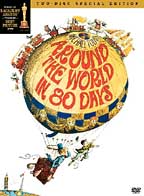 British director Michael Anderson takes us on a whirlwind world tour in the famous Hollywood travelogue "Around the World in Eighty Days" with David Niven. The splendid full colour pastiche was followed by the considerably slower paced in-depth docu-drama, "The Dam Busters" with Richard Todd as Wing Commander Guy Gibson and Michael Redgrave recreating the bumbling but brilliant Professor Barnes Wallis.
British director Michael Anderson takes us on a whirlwind world tour in the famous Hollywood travelogue "Around the World in Eighty Days" with David Niven. The splendid full colour pastiche was followed by the considerably slower paced in-depth docu-drama, "The Dam Busters" with Richard Todd as Wing Commander Guy Gibson and Michael Redgrave recreating the bumbling but brilliant Professor Barnes Wallis.
 Read the full review of "Around the World . . ." here and the full review of "The Dam Busters" here from the archives.
Read the full review of "Around the World . . ." here and the full review of "The Dam Busters" here from the archives.
Opening up new horizons of discovery for you in the comfort of your own home, TVOntario's Saturday Night at the Movies.
It Happened One Night (1934)
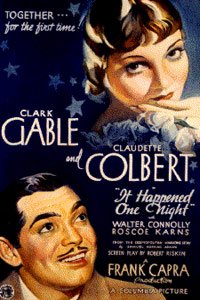 Claudette Colbert and Clark Gable define “Capraesque” in this madcap Depression era comedy that marries glamour and glitz to populist sentiment. Tag along for a wild ride with this TVO Saturday Night at the Movies special on Frank Capra’s classic Hollywood film .
Claudette Colbert and Clark Gable define “Capraesque” in this madcap Depression era comedy that marries glamour and glitz to populist sentiment. Tag along for a wild ride with this TVO Saturday Night at the Movies special on Frank Capra’s classic Hollywood film .
See the video preview from TVO
The Good Old Bad Old Days
I sometimes wonder if my grandmother would have gone to see a film like “It Happened One Night” at the movie theatre. I look at black and white photos with the funny old hats and the rattletrap black Model Ts and chuckle.
When I was a child at my grandmother’s house, I remember being fascinated by a pretty little music box that played a sweet and sentimental tune from a bygone era. The tune was called “Always”. That sweet little melody from the music box somehow captured for my childish mind something that I witnessed in my grandparents’ marriage. It was a marriage which lasted for over half a century. What I witnessed was something good, something true and something real.
I also remember the odd little wood frame cottages that my grandparents used to rent to “vacationers” up from the big city who came to enjoy a period of respite by the lake. The cabins were exactly the modest kind of affairs that were seen in the “It Happened One Night”; the kind that Claudette Colbert and Clark Gable stayed in at the roadside “auto camps” pictured in this 1930’s film. They were so small and so much less complicated than what people get these days when they “rent a cottage” while on vacation. And the cost? Single digit dollars for a night’s stay? Well, there’s no comparison!
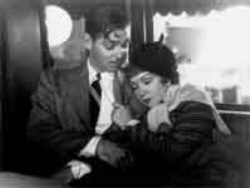 Things were so much different in those days. Goodness gracious me! The smoking for example - How attitudes have changed! Once upon a time it was considered the height of chic to have a cigarette dangling from your fingertips in movieland. And all the fuss about a young unmarried woman gallivanting around the countryside without a chaperone! It was unthinkable for a decent young lady at the time to exercise such independence. We were treated to sexist attitudes galour what with all the fanny slapping and skirt hiking going on. It was not just the the terribly annoying bus seatmate, Oscar Shapely, whom I found to be particularly loathsome for his extremely sexist behaviour.
Things were so much different in those days. Goodness gracious me! The smoking for example - How attitudes have changed! Once upon a time it was considered the height of chic to have a cigarette dangling from your fingertips in movieland. And all the fuss about a young unmarried woman gallivanting around the countryside without a chaperone! It was unthinkable for a decent young lady at the time to exercise such independence. We were treated to sexist attitudes galour what with all the fanny slapping and skirt hiking going on. It was not just the the terribly annoying bus seatmate, Oscar Shapely, whom I found to be particularly loathsome for his extremely sexist behaviour.
Perhaps some things are best left behind in the dust of history as “bad ideas that didn’t quite work” – kind of like that misshapen autogyro plane contraption that the celebrity aviator, King Westley, descends in for his highly publicized society wedding. Thank goodness that much of today’s society has moved on from such awkward and ill-conceived encumbrances.
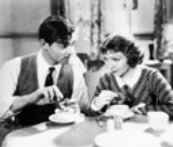 The misadventures of the fabulously wealthy heiress, Ellie Andrews, are apparently of national interest. Ellie runs away from a controlling father and into the arms of her shallow and self-preoccupied fiancé, King Westley. During her mad flight to freedom Ellie encounters for the first time life as it is commonly lived. Waiting in line to go to the bathroom, not having enough money to buy lunch, and losing all her worldly possessions in her luggage are all novel experiences for Miss Ellie.
The misadventures of the fabulously wealthy heiress, Ellie Andrews, are apparently of national interest. Ellie runs away from a controlling father and into the arms of her shallow and self-preoccupied fiancé, King Westley. During her mad flight to freedom Ellie encounters for the first time life as it is commonly lived. Waiting in line to go to the bathroom, not having enough money to buy lunch, and losing all her worldly possessions in her luggage are all novel experiences for Miss Ellie.
They were certainly common enough experiences for most folk in Frank Capra’s 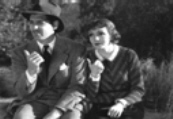 Depression era audience. Perhaps the juxtaposition of the everyday experiences of the ingénue, Miss Anderson, with the glitz and glamour of her former life account for the film’s runaway success at the box office and at the Oscars. While the film’s popularity might be a little hard to account for by today’s standards, it certainly had something to offer to the audience of its day.
Depression era audience. Perhaps the juxtaposition of the everyday experiences of the ingénue, Miss Anderson, with the glitz and glamour of her former life account for the film’s runaway success at the box office and at the Oscars. While the film’s popularity might be a little hard to account for by today’s standards, it certainly had something to offer to the audience of its day.
Ellie’s unpreparedness for life outside of the shelter of the family fortune is equalled only by her lack of preparation for a relationship with someone like Peter Warne.
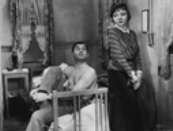 Enter Clark Gable playing “the real man”. Tossing the lack of an undershirt during the disrobing scenes aside for the moment, what seems to define Peter Warne as a “real man” is his lack of regard for the pretensions of the well-heeled socialite. Miss Ellie’s shiny high heels do indeed get her in trouble. They cause her considerable discomfort after a long walk over farmers’ fields and dirt roads. After enough failed expectations and consequent discomfort, Ellie begins to rethink some of her basic approaches to life.
Enter Clark Gable playing “the real man”. Tossing the lack of an undershirt during the disrobing scenes aside for the moment, what seems to define Peter Warne as a “real man” is his lack of regard for the pretensions of the well-heeled socialite. Miss Ellie’s shiny high heels do indeed get her in trouble. They cause her considerable discomfort after a long walk over farmers’ fields and dirt roads. After enough failed expectations and consequent discomfort, Ellie begins to rethink some of her basic approaches to life.
It may be apparent to most why Ellie would want to reconsider her impending matrimonial state to the vain and obsequious King Westley. While Peter Warne might be a handsome and footloose enough fellow to be considered as a replacement, it remains a mystery as to why Ellie would want to marry anyone at all in the first place. It just seems to be a given that Ellie has to marry somebody by the end of the film. After all, we have to have an excuse to display the gorgeous satin wedding gown and Claudette Colbert’s exquisite figure in the said gown.
Ellie’s first impulse is to marry out of spite. Her next decision seems to be to marry out of resignation and despair. Will she finally get it right the third time around and marry “for love”? We all are certainly left hoping so.
 But there’s something missing here. People don’t go around getting married just in order to escape their present dilemmas, to have sex and to oblige social expectations. Well, I mean, they do, but - well, you would hope there would be something more to it than that. And I don’t mean that sappy doe-eyed look and the equally silly song about “Young people in love are never hungry . . .”! That’s all part of the Hollywood romance legend. It’s very appealing for selling movie theatre tickets.
But there’s something missing here. People don’t go around getting married just in order to escape their present dilemmas, to have sex and to oblige social expectations. Well, I mean, they do, but - well, you would hope there would be something more to it than that. And I don’t mean that sappy doe-eyed look and the equally silly song about “Young people in love are never hungry . . .”! That’s all part of the Hollywood romance legend. It’s very appealing for selling movie theatre tickets.
The only examples of “marital bliss” that we see depicted on the screen are, to be frank, disturbing ones. There’s the slimy Shapely, the obnoxious and unscrupulous seatmate who thinks nothing of cheating on his wife and pretty babies while away on a business trip. There is the henpecked and feckless husband and his overbearing wife who make up the couple who own the auto camp. There is King Westley who is entirely unapologetic for marrying for money and prestige while paying the small price of placating the spoiled heiress. Even the songsters on the bus who regale us with the account of “The Daring Young Man on the Flying Trapeze” have only a tale of bravado and betrayal to tell, entertaining though it may be.
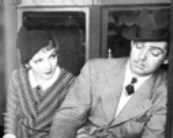 And then there is the “big act” that Ellie and Peter put on for the benefit of the private detectives while at the auto camp. Ellie and Peter play the parts of an old married couple complete with bickering, manipulation, the insinuation of alcoholic delinquency and verbal abuse in order to throw the detectives off the scent. Everyone just accepts the premise that this is how a “normal” married couple behaves and leaves them alone. What a perfect disguise!
And then there is the “big act” that Ellie and Peter put on for the benefit of the private detectives while at the auto camp. Ellie and Peter play the parts of an old married couple complete with bickering, manipulation, the insinuation of alcoholic delinquency and verbal abuse in order to throw the detectives off the scent. Everyone just accepts the premise that this is how a “normal” married couple behaves and leaves them alone. What a perfect disguise!
In Peter’s conversation with Ellie’s father at the conclusion of the film, the doting papa is evidently persuaded that a man who only wants $39.60 for expenses instead of a blackmailer’s ransom is the very man to whom he can entrust the hand of his daughter in marriage. Never mind Peter’s exclamation that “what (Ellie) needs is a guy that'd take a sock at her once a day, whether it's coming to her or not. If you had half the brains you're supposed to have, you'd have done it yourself, long ago!”
Oh dear!
Given the dismal depiction that married life receives during the course of the film, one wonders why anyone would be crazy enough to want to enter into the state of conjugal bliss in the first place.
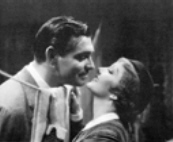 But it is Hollywood after all. And everyone was in the mood for a bit of fun and a big dose of low cost entertainment. People had enough to deal with in real life during the Depression. In those days, my family were just some of the many ordinary folk. I know that they certainly had more than enough to cope with "in just getting by" in the good old bad old days. For just a brief, magical moment with the silver screen flickering in the dim light, it's nice to think that the honeymoon will never end.
But it is Hollywood after all. And everyone was in the mood for a bit of fun and a big dose of low cost entertainment. People had enough to deal with in real life during the Depression. In those days, my family were just some of the many ordinary folk. I know that they certainly had more than enough to cope with "in just getting by" in the good old bad old days. For just a brief, magical moment with the silver screen flickering in the dim light, it's nice to think that the honeymoon will never end.
Related Reading:
- Bible quiz time: Did the original story of the walls of Jericho occur in the book of Exodus (apologies to Paul Newman), Deuteronomy, or Joshua (not the guy with the bad hair in Cecil B. De Mille production)
- The junk in the trunk: How the stuff you forgot to unpack after the honeymoon was over can skuttle even the best of relationships
- “Yes, but will she still respect you in the morning?” Respect in communication as a missing ingredient.
- Director/producer Frank Capra was the originator of the “one man, one film” concept. Whose name gets top billing on your life’s story?
East of Eden (1955)
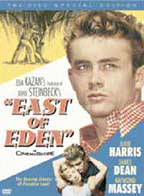 James Dean gives an exceptional performance in this now classic film of John Steinbeck’s classic novel of the same name. A movie well worth seeing, “ East of Eden”, with a strong supporting performance from Julie Harris as Abra, shows off Jimmy Dean with sophistication and poise in his “rebel” character. Presented as one of a trilogy of films directed by Elia Kazan on TVO’s Saturday Night at the Movies.
James Dean gives an exceptional performance in this now classic film of John Steinbeck’s classic novel of the same name. A movie well worth seeing, “ East of Eden”, with a strong supporting performance from Julie Harris as Abra, shows off Jimmy Dean with sophistication and poise in his “rebel” character. Presented as one of a trilogy of films directed by Elia Kazan on TVO’s Saturday Night at the Movies.
Video preview from TVO here.
Paradise Lost
They were at it again - my two munchkins brawling in the backseat: “She did it to me first!” – “But he said that I was a . . .” – “She has her stuff on my side!” – And on and on it goes. Often enough it comes to blows before the emotions of the moment blow over. Sibling rivalry, common enough phenomenon that it is, can be so draining for a parent.
And then there is all the relationship stuff about working through wrongdoing, repentance, forgiveness and reconciliation. It’s amazing how many times we go through it. My daughter is especially prone to veering off the straight and narrow in a fit of temper that needs a course correction along the way.
She climbs up on my knee after a particularly stormy session and we talk calmly about what has happened. In those moments, she needs me to tell her once again that Mommy loves her no matter what she does. We try to talk about what a new and brighter future will look like, avoiding the mistakes of the past. Kisses and hugs and reassuring words follow in abundance. It’s all a part of growing up.
At least it is for my kids. When my son gets his feelings hurt in the latest spat with his sister or in some confrontation with his parents, he just runs off to his room. The stakes were considerably higher in the film, East of Eden .
 As a story about the conflicts of emerging adults, sibling rivalry in the case of Cal and Aron Trask involves slightly more serious consequences. After feeling betrayed by his girlfriend’s shifting allegiances and the earth shattering revelations of his brother concerning their mother’s true identity, Aron runs off to enlist in World War I, presumably to his death on some European front of military action.
As a story about the conflicts of emerging adults, sibling rivalry in the case of Cal and Aron Trask involves slightly more serious consequences. After feeling betrayed by his girlfriend’s shifting allegiances and the earth shattering revelations of his brother concerning their mother’s true identity, Aron runs off to enlist in World War I, presumably to his death on some European front of military action.
The characters of East of Eden, although they do have the archetypal thing going on, appear to be more fully developed than cardboard cut-out characters of “the good son” and the “the bad son”. Just about everyone, it seems, is more than who they appear to be at first. The father, Adam, a cold and distant figure, is more complex and compassionate than we think at first. The mother, Kate, while still a hardened brothel madame, shows perhaps just a chink in her steely armour which allows for a slight hint of humanity to leak out.
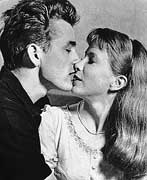 An attempt is made to maintain the epic sweep of the original Steinbeck story through the use of cinemascope. With our rinky-dink 13 inch television screen with bunny ear reception, one has to use quite a bit of imagination to “get the full effect” of the wide-screen experience as it was originally conceived of for the movie theatre. I’m afraid that on only 13 inches worth of screen, the cropped look of cinemascope just ends up being a small and squinty annoyance. It is involvement with the storyline and the thematic material keep the “epic effect” alive for me.
An attempt is made to maintain the epic sweep of the original Steinbeck story through the use of cinemascope. With our rinky-dink 13 inch television screen with bunny ear reception, one has to use quite a bit of imagination to “get the full effect” of the wide-screen experience as it was originally conceived of for the movie theatre. I’m afraid that on only 13 inches worth of screen, the cropped look of cinemascope just ends up being a small and squinty annoyance. It is involvement with the storyline and the thematic material keep the “epic effect” alive for me.
And there is more than enough of that kind of stuff to go around. Allusions hearken back to the biblical Cain and Abel story. An attempt is made to delve into the origins of human behaviour and human nature. Cal Trask, in trying to figure out who he is and why he is the way he is, takes 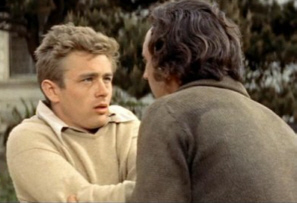 us all on a journey to the outer reaches of the human soul. We see Cal develop from a brooding, reactive youth and evolving into the first steps of responsible adulthood by the end of the film.
us all on a journey to the outer reaches of the human soul. We see Cal develop from a brooding, reactive youth and evolving into the first steps of responsible adulthood by the end of the film.
In the end, Cal quotes some of the good stuff that he got from his dad and demonstrates that he is, in some measure, trying to put it into practice: “A man has a choice and it’s a choice that makes him a man.”
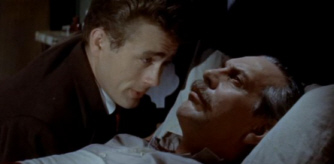 Cal chooses to stay with his ailing dad in his final days instead of just making the easy choice to “take the money and run”.
Cal chooses to stay with his ailing dad in his final days instead of just making the easy choice to “take the money and run”.
Funny that. One of Adam Trask’s less than shining moments revolves around the reading of Psalm 32 at the dinner table. Cal reads the Scriptures aloud with a defiant emphasis on reading out the verse numbers. (His father, Adam, repeatedly tells him this is not necessary.) Because the focus of the moment is on the relational conflict between the father and the son and all of their unresolved issues, the way Cal reads the psalm aloud becomes more important in this scene than anything that the Scriptures actually have to say. Bible reading becomes background noise; a device for illustrating the emotional tone of the dramatic conflict.
 An irony is of course intended by the author, Steinbeck. This particular psalm is actually the recounting of a very passionate and emotional experience of personal forgiveness and reconciliation on the part of the psalmist. It’s not just a droning background noise of boring and irrelevant “religious speak” as Cal hears it to be. The psalm depicts in ancient poetry the very thing that is obviously missing in the modern day experiences of the film’s characters. Unfortunately, Cal stops at verse 8 and never gets to verses 9 and 10. He is distracted by his dysfunctional relationship with his father. Dean’s character might get to that point later in the film, but for Cal it had nothing to do with reading or understanding the bible. It’s a secular redemption story in operation in this film, making use of biblical language and concepts as a backdrop.
An irony is of course intended by the author, Steinbeck. This particular psalm is actually the recounting of a very passionate and emotional experience of personal forgiveness and reconciliation on the part of the psalmist. It’s not just a droning background noise of boring and irrelevant “religious speak” as Cal hears it to be. The psalm depicts in ancient poetry the very thing that is obviously missing in the modern day experiences of the film’s characters. Unfortunately, Cal stops at verse 8 and never gets to verses 9 and 10. He is distracted by his dysfunctional relationship with his father. Dean’s character might get to that point later in the film, but for Cal it had nothing to do with reading or understanding the bible. It’s a secular redemption story in operation in this film, making use of biblical language and concepts as a backdrop.
 I happened to read psalm 32 a few evenings before I chanced to see this film. My personal experience of reading the psalm again was very different from the “disembodied” version presented in the film. It was very striking to hear these words repeated a couple of days later and put to a very different use by Elia Kazan et al.
I happened to read psalm 32 a few evenings before I chanced to see this film. My personal experience of reading the psalm again was very different from the “disembodied” version presented in the film. It was very striking to hear these words repeated a couple of days later and put to a very different use by Elia Kazan et al.
Ain’t that the way things go? It reminds me of our most recent family bible reading attempt around the Sunday dinner table. In spite of our best efforts to connect and pass on a significant spiritual heritage to our offspring, one kid was standing on her head in her chair and the other petulantly kept asking to play the “game” we did two weeks ago as part of our family time (a game which involved much throwing of teddy bears at each other by way of “spiritual illustration through kinaesthetic action” – it was very popular at the time.).
Sigh. Not much seemed to be getting through. Oh well. So much for transmitting a godly heritage, at least for that particular day. It’s a good thing you get more than one chance at attempting to be a good parent.
 I’m very glad to have finally seen the famous “East of Eden ” in the James Dean trilogy. It was also nice to see the other two Elia Kazan offerings “Viva Zapata” and “A Steetcar Named Desire” on the same night, thanks to TVO. It was definitely a treat.
I’m very glad to have finally seen the famous “East of Eden ” in the James Dean trilogy. It was also nice to see the other two Elia Kazan offerings “Viva Zapata” and “A Steetcar Named Desire” on the same night, thanks to TVO. It was definitely a treat.
Suggested Reading:
-
Fimlmcritic.com on the Method of the Method Actor
-
Refresh my memory on that weird Cain and Abel thing that was happening back there.
-
Forgiveness hurts . . .and heals
-
“Where ya headed Jimmy Dean?”
-
Elia Kazan directed this 2 hour picture to great effect. But who’ve you got in the director’s chair of your life production right now?
Venia: Father and son, a modern-day parable on forgiveness
Dirty Rotten Scoundrels (1988) & The Grifters (1990)
Who's Conning Who?
 Steve Martin and Michael Cain are fun and frothy in this comic look at the con game (Dirty Rotten Scoundrels). The Huston/Cusack/Bening trio in The Grifters tells us something quite different about the seamier side of the life of a con artist. It's not all fun and games.
Steve Martin and Michael Cain are fun and frothy in this comic look at the con game (Dirty Rotten Scoundrels). The Huston/Cusack/Bening trio in The Grifters tells us something quite different about the seamier side of the life of a con artist. It's not all fun and games.
See the full review here.
The Bridge On the River Kwai (1957)
The War Within
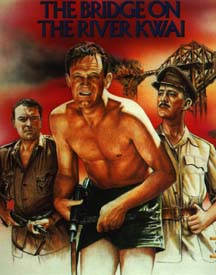 Saturday Night At the Movies on TVO brings us an interesting and entertaining character study. William Holden and Alec Guiness convincingly portray men at opposite poles caught in the rat trap of a Japanese P.O.W. camp situated in a remote jungle during WWII.
Saturday Night At the Movies on TVO brings us an interesting and entertaining character study. William Holden and Alec Guiness convincingly portray men at opposite poles caught in the rat trap of a Japanese P.O.W. camp situated in a remote jungle during WWII.
Catch the full review here. The original review pairs "The Bridge On the River Kwai" with "King Rat".



